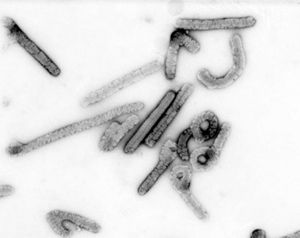BioCryst Pharmaceuticals Inc., a developer of drugs for infectious and rare diseases in Durham, North Carolina, says National Institutes of Health (NIH) is continuing its contract with the company to develop a treatment for Marburg virus, the cause of a rare but dangerous tropical disease. The contract extension, says BioCryst, is worth $2.5 million, increasing the funds allocated for the project so far by about half.
Marburg virus is the cause of Marburg hemorrhagic fever, a disease marked by severe headaches and bleeding, often from several sites in the body. The disease develops rapidly, with bleeding occurring after five to seven days. While rare, the disease can spread rapidly into epidemics with high fatality rates — more than 80 percent in the Democratic Republic of Congo from 1998 to 2000. The virus, one of the most virulent to affect humans, is related to the deadly Ebola virus, but it currently has neither a vaccine nor a treatment.
In September, National Institute of of Allergy and Infectious Diseases, a division of NIH, awarded a contract with BioCryst to develop its drug code-named BCX4430 to treat Marburg virus, in this case as a medical countermeasure for potential biological weapons. The initial payment to BioCryst was about $5 million, although if all options are exercised by NIH, the contract could run as high as $22 million. This new extension exercises one of those options.
BioCryst designs treatments to meet specific protein targets associated with a disease. The company says its technology uses crystallography first to determine the three-dimensional molecular structure of the target proteins, and then to fit the synthesized compounds as tiny molecular crystals into the targets.
BCX4430 is designed to inhibit enzymes that encourage the replication of DNA molecules associated with Marburg virus, but the company says it has shown in lab tests to have potential against a broad range of similar viruses, such as Ebola. The project funded by NIH is expected to lead to investigational new drug applications with the Food and Drug Administration, and early-stage human clinical trials.
Read more:
- NIH Giving In-Kind Technical Services for Rare Diseases
- Nimbus, Shire Partner on Rare Genetic Disease Drug Discovery
- FDA Designates Orphan Drug for Rare Pain Condition
- Database Enables Documentation of Rare Genetic Disorders
- Challenge Seeks Discontinued Drugs to Treat Rare Diseases
* * *


 RSS - Posts
RSS - Posts
You must be logged in to post a comment.